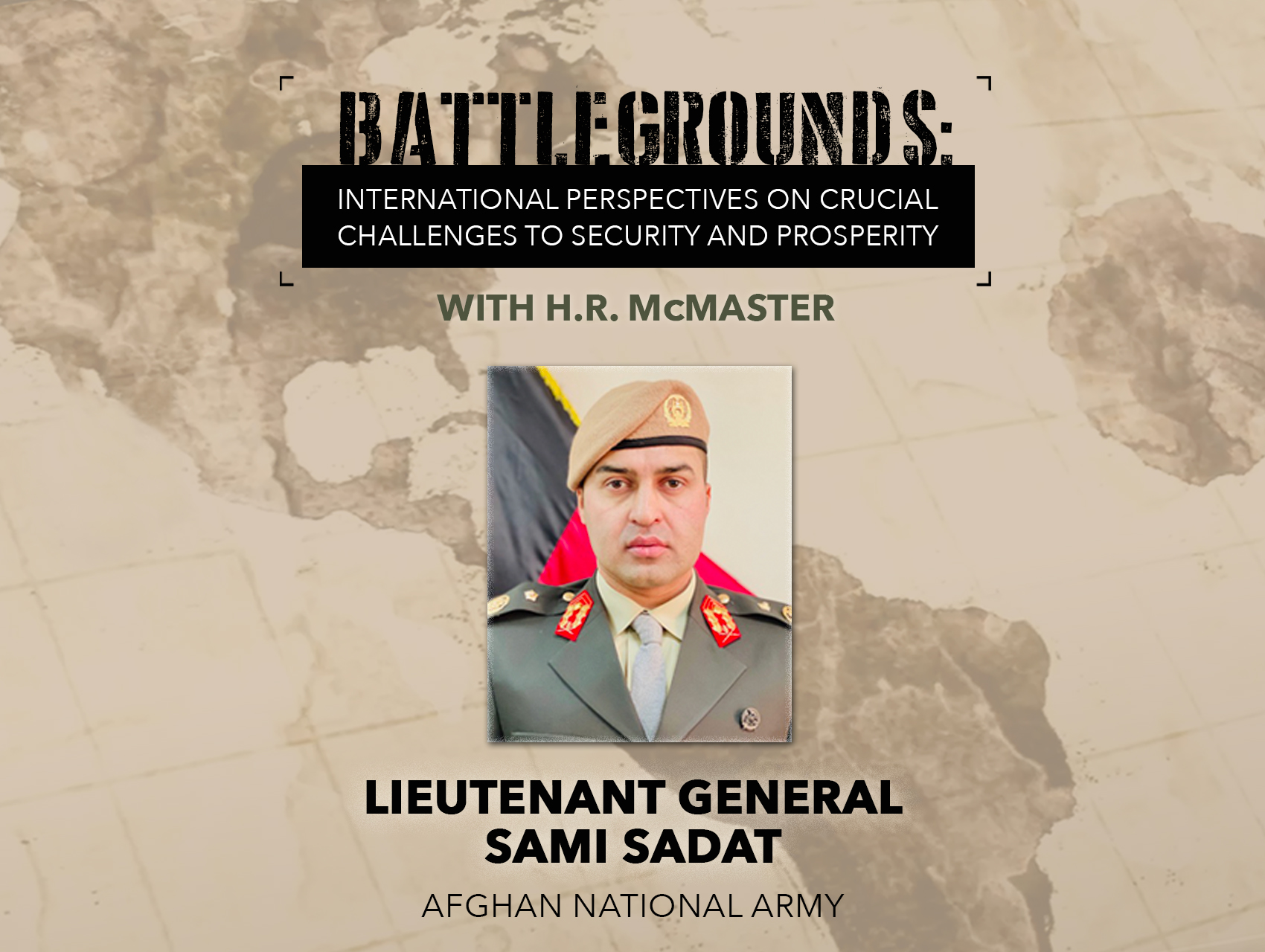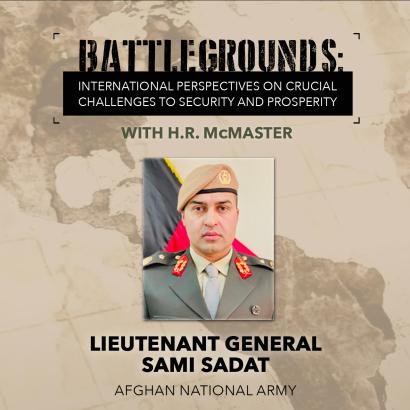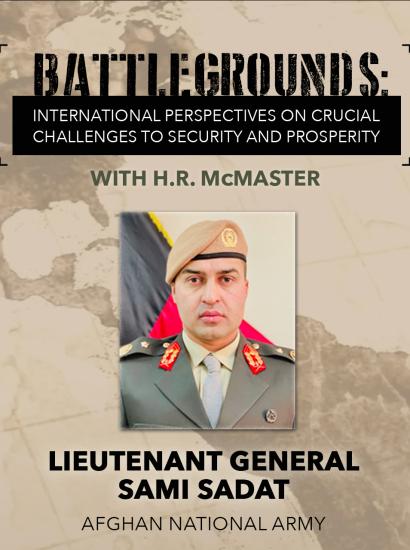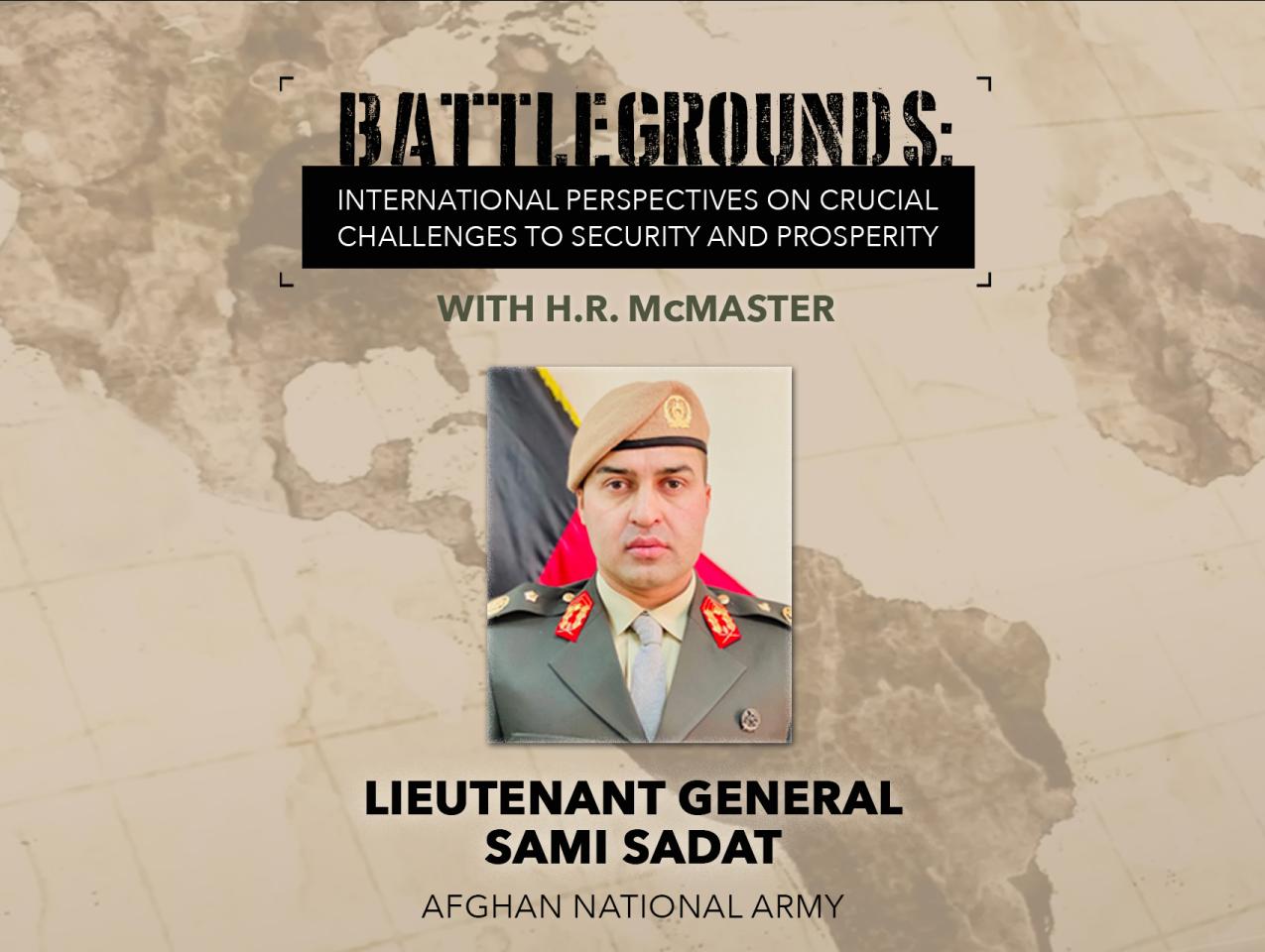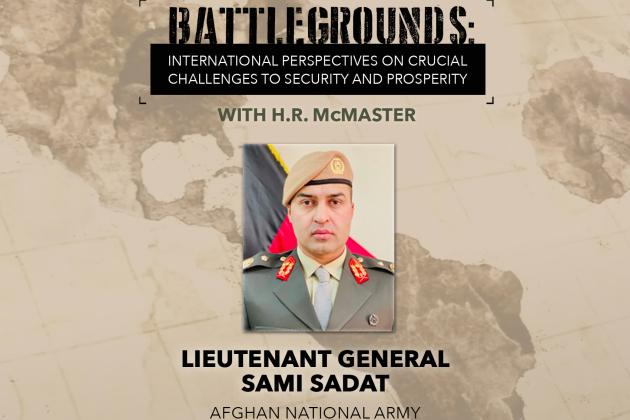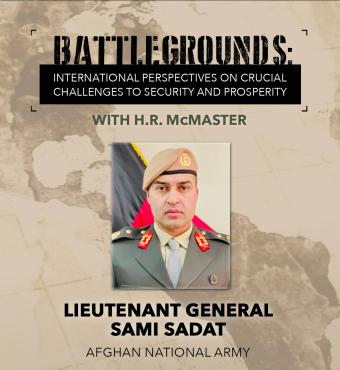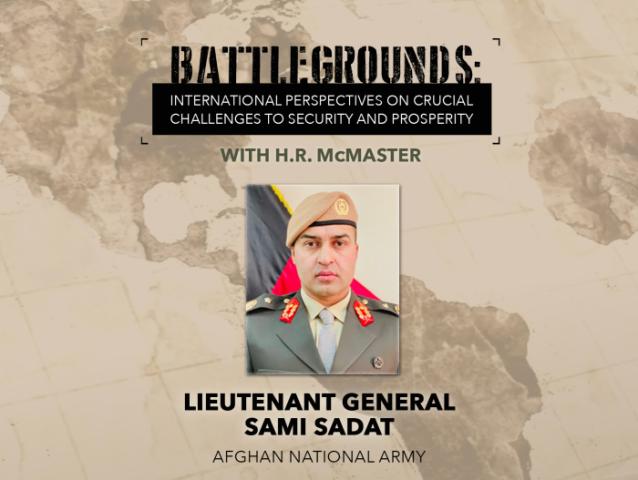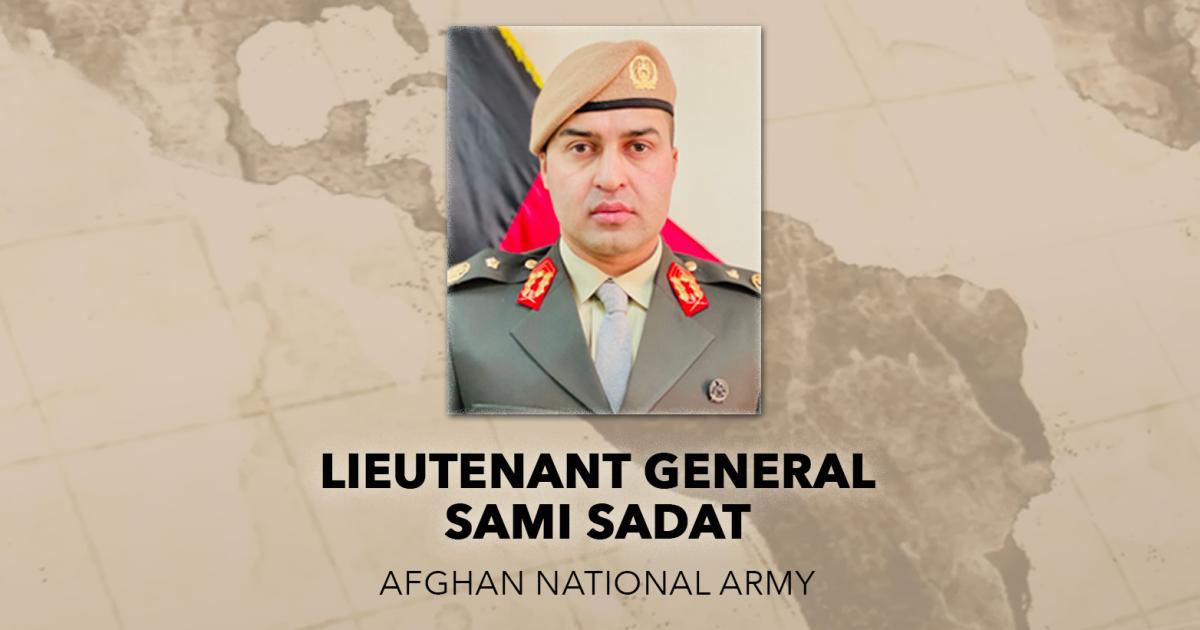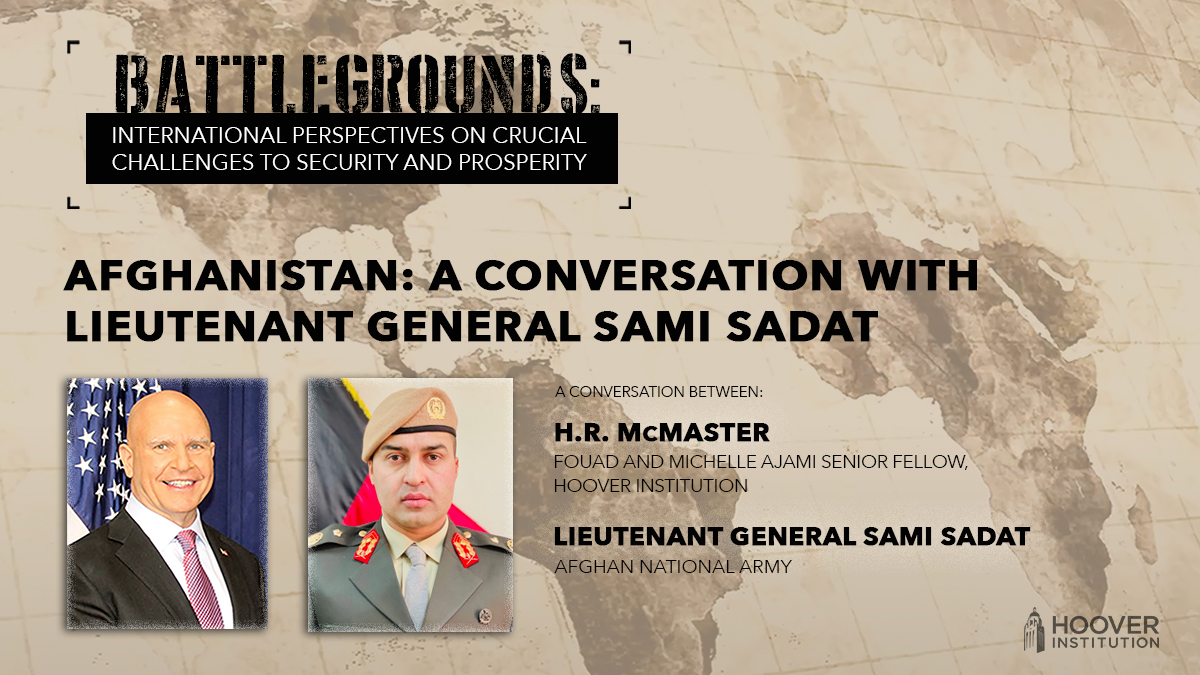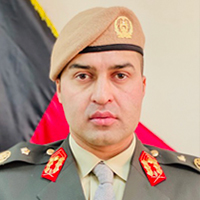
In this episode of Battlegrounds, H.R. McMaster and Afghan Lieutenant General Sami Sadat discuss the events that contributed to the fall of Afghanistan, the flawed assumptions that led to US withdrawal, and how the US government and Afghan resistance can jointly support both the Afghan state and, in turn, global security.
H.R. McMaster in conversation with Lieutenant General Sami Sadat, Afghan National Army, on Wednesday, April 19, 2023.
>> H. R. McMaster: America and other free and open societies face crucial challenges and opportunities abroad that affect security and prosperity at home. This is a series of conversations with guests who bring deep understanding of today's battlegrounds and creative ideas about how to compete, overcome challenges, capitalize on opportunities, and secure a a better future.
I am H.R McMaster, this is Battlegrounds.
>> Speaker 2: On today's episode of Battlegrounds, our focus is on Afghanistan's troubled past, perilous present, and prospects for the future. Our guest, Lieutenant General Sami Sadat, is a leader of the afghan army who devoted his career to defending his nation and protecting the Afghan people from Taliban aggression.
General Sadat grew up during the final years of the Soviet occupation of Afghanistan. At that time, Mujahideen fighters, supported by the intelligence services of the United States, Pakistan and Saudi Arabia fought against the Soviet army and the soviet backed Afghan government. In 1989, as Soviet troops departed and the Soviet Union began to collapse, support for the government in Kabul dried up.
In 1992, a brutal civil war broke out after anti communist Mujahideen militias unseated the last pro Soviet leader, Mohammad Najibullah. Najibullah and his brother fled the Arg palace and were granted sanctuary at the United nations compound. During the civil war, warlords and thugs preyed on the Afghan people with impunity.
Former anti-soviet allies turned on each other. They extorted the population and engaged in murder, torture, rape, and egregious child abuse. The Taliban pledged to end the chaos and criminality. In 1996, with Pakistani support, the Taliban took over Kabul. The Taliban leader, one-eyed cleric Mallah Omar, declared Afghanistan a completely Islamic state in which a complete Islamic system will be enforced.
Omar purged the country of political opposition, which included ordering the brutal murder of Najibullah and his brother. The Afghan people wanted order, but the Taliban inflicted a new form of brutality on them based on a ruthless purity agenda. The Taliban arrested and jailed General Sadat`s father, who had been an active member of the resistance to soviet occupation and the Taliban.
The Taliban gave safe haven to the terrorist group al Qaeda after that organization conducted the most destructive terrorist attack in history against the United States. On September 11, 2001, the United States military and intelligence agencies, allied with afghan anti-Taliban militias to unseat the Taliban from power by the end of that year.
In 2005, after graduating from secondary school in Afghanistan, Sadat moved to Europe to study military operations. He completed the NATO Military Academy in Munich and the Polish Defense Academy's battalion command course. In 2011, he graduated from the Joint Services Command and Staff College at the Defense Academy of the UK and he earned a masters from the UK Charter Management Institute the following year.
General Sadat returned to Afghanistan and served at the ministry of the Interior, the National Directorate of Security, the High Peace Council, the Afghan government's program under President Karzai to negotiate with representatives of the Taliban and held multiple senior military positions. In August 2021, soon after General Sadat was appointed to command Afghan special forces, the security situation and the Afghan government collapsed, concurrent with withdrawal of US forces and personnel.
The Taliban returned to power and reinstated their oppressive regime based on a perversion of Islamic law. The Taliban has segregated women and girls from public life and stripped them of many of their rights, including the ability to attend secondary school or hold most jobs. It restricts access to civil liberties and human rights.
Reports from the United Nations describe extrajudicial killings, torture, arbitrary arrests, and forced marriages. Amidst the overall extinguishment of human freedoms, tens of thousands of Afghans who served with the US and coalition forces are still waiting on special immigrant visas to immigrate to the United States. And dozens of American citizens remain stranded in the country.
The Afghan people face a dire combination of economic security and humanitarian crises, exacerbated and perpetuated by brutal Taliban rule. We welcome General Sadat to discuss his experiences, the state of affairs in Afghanistan, and prospects for the future of his country.
>> H. R. McMaster: General Sami Sadat, welcome to Hoover, welcome to Stanford University.
It's a real privilege to host you here for Battlegrounds, thank you so much for joining us.
>> Speaker 2: Thank you for having me, General McMaster. It's an honor and a privilege to sit down with you on this podcast.
>> H. R. McMaster: No, it's an honor for me to sit down with a fellow soldier who fought with such courage.
Under the most difficult conditions one can imagine, up to the last moment in Afghanistan, which is heartbreaking for both of us and especially for you and your family, who have borne the brunt of the disaster in Afghanistan since August of 2021. I'd love to talk to you about a lot of things here, there's so much to talk about.
But I thought we might just begin with the present, right? It's very hard these days because of the brutality of the Taliban regime and the control they've exerted over the country. To understand what's happening in the country now, could you maybe explain to our viewers how you see the situation in Afghanistan today?
>> Lieutenant General Sami Sadat: So, General McMaster brother, a couple of things that are seriously impacting the daily life of Afghans is one, is the economy has completely collapsed, unfortunately. Second is the brutality of Taliban, violence is in every single door. Violence is on the street, violence is in the school. Violence is in the bazaar, in the marketplace, everywhere you go, the Taliban come and beat people.
They mess with people's how you look, not only women, but actually men as well. The harshest restrictions came on Afghan women, women are not allowed to go out of house without a male chaperone. Women are banned from education, women are banned from working outside. Unfortunately, this is one of the darkest things that in 2023, a nation can undergo.
This is basically, literally savagery. In the modern era, I would say this is the lowest human point that anyone can get. Is the Taliban bringing the Afghan people into that point. The third thing which can affect the rest of the world is really terrorism. General McMaster, I'm following some of the terrorist groups that are coming back.
16,000 regional members of terror groups, have moved into Afghanistan immediately after the fall of Afghanistan into the Taliban. And then throughout the last 19 months, I'm following large number of Al Qaeda members from North Africa, from Yemenite, from Middle east, from Iraq, moving to Afghanistan via Iran. And some of them are bringing their families.
And the fourth thing is really, the Taliban are creating quite a hostile environment in our region. They already had fights with Pakistan, which was their master Taliban were literally poppet of Pakistan. But as soon as they took power, they kinda went after the Pakistanis, they had border clashes with Iran, they had border clashes with Tajikistan and Uzbekistan.
And it continues to be a very hostile environment. One of the things that I say is terrorism, and you know better than anyone else is that terrorism does not remain consigned in one location, they tend to go out and do things. In 1997, when the Taliban took over Afghanistan and they invited al Qaeda, by 2001, al Qaeda pulled 9/11.
In 1990s, there was a handful of al Qaeda leaders in Afghanistan. It was people like Abu Musab al Zarqawi, Abu Bakr al Baghdadi, Saiful Adil, al Zawahiri, bin Laden, and we know all of them work for. There was a handful of people, and they managed, managed to pull 9/11.
Today, as you and I speak, there is 800 al Qaeda commanders in Afghanistan. These are more sophisticated, these are much more savvy with how to fight the United States and the rest of the world and their battle hardened. So I believe the rescue of al Qaeda today is much greater than it was in 2001.
>> H. R. McMaster: So really, what I'm drawing from your comments, two big consequences. One is humanitarian, and the other is security related to the growth of jihadist terrorist strength in Afghanistan. One of the elements of self-delusion, as we talked ourselves into a complete withdrawal from Afghanistan and so-called ending the endless wars.
Of course, wars don't end when one party disengages, this war is continuing. But one of the key elements of our self-delusion was the Taliban was separate in some way from other jihadist terrorist organizations, in particular al Qaeda. And the ISI, when in fact, the Taliban depends on this relationship, reconstituted with the help of al Qaeda and ISI after 2001 to 2002.
Could you maybe describe how these organizations are intertwined? For example, the kind of unit that took over the Kabul airport after the US withdrawal, which was an al Qaeda brigade, essentially. Can you just explain the nature of this enemy, how they're intertwined? Because I think we try just too hard to disconnect the dots between these organizations.
>> Lieutenant General Sami Sadat: Some of this is assumptions and others are politics, really. I mean, the intelligence community and the US and Afghan military, we knew what was going on. I was leading a counterterrorism unit, a joint CIA Afghan intelligence task force that was targeting al Qaeda. And in 2017, al Qaeda has built up their first battle unit after a long time in Ghazni province, Afghanistan.
These were more people from Punjab of India, Punjab of Pakistan, what they called themselves al Qaeda in Indian subcontinent. We began to realize that this unit was particularly created to contribute man into the battle formation of the Taliban. At some point a year earlier, they have managed to take over the city of Ghazni.
And then al Qaeda continued to support the Taliban in a much more sophisticated way and manner in Pakistan and Afghanistan. ISI was also supporting both al Qaeda and Taliban in a manner that would hurt the Americans and Afghans enough so the Afghans and Americans would come to Pakistan and pay Pakistan.
So war on terror for us, for Afghans and Americans, was real, but for Pakistan, it was a sideshow to make money out of what was happening. Unfortunately, lack of regional consensus have caused, today, Pakistan is in a very bad situation. I'm afraid that if the world doesn't help Pakistan in the next few years, Pakistan will completely collapse and crumble like Afghanistan.
And the problem with that is we're a small nation, we're a nation of 39 million people, Pakistan is almost 300 million people. Pakistan is a nuclear-armed nation, you know that it could have really, really major global consequences. Today, as we speak, Abdullah bin Laden, son of bin Laden, is in Kandahar, he's married to a Kandahari woman.
And the beginning of the Taliban that came to Afghanistan, Abdullah bin Laden was an advisor to Malayaqu, and he was sitting with Malayaqub. He was flying with Malayaqub in the helicopters, and he was known as the advisor. And after the Zawahiri strike, he was sent back to Kandahar to hide there.
And a lot of other al Qaeda members that were roaming around Kabul, Ghazni, and Logar and other provinces were also pushed down to west and southwestern Afghanistan, closer to the Iranian and Iranian border, being afraid of the drone attacks. So in conclusion, there is no way you can separate the Taliban from al Qaeda and al Qaeda from Taliban.
I think there is a degree of separation between ISI and al Qaeda, perhaps a greater degree of separation today and a smaller degree of separation between ISI and the Afghan Taliban.
>> H. R. McMaster: Of course, one of the people that really connects the Taliban with al Qaeda's Siraj Haqqani. And I thought maybe you could talk about some of the people who are in the Taliban government and maybe describe even more why it's so dangerous to cede, to surrender to a terrorist organization and give them a nation-state.
Because, of course, it's Siraj Haqqani who's printing passports for terrorists who want to travel internationally, for example. And you mentioned how many terrorists from various organizations are going to Afghanistan, which is becoming a kind of a haven for jihadist terrorists.
>> Lieutenant General Sami Sadat: For Sarrajdin Haqqani, the relationship with al Qaeda is generational.
His father, Jalaluddin Haqqani, was a good friend of Osama bin Laden. And his father was so close to al Qaeda that the Arab al Qaeda members have given him a daughter. Jalaluddin Haqqani married a Yemeni woman, one of the mothers of Siraj, who's the mother of Anas Haqqani, if you know him.
Anas's mother is from Yemen.
>> H. R. McMaster: She's the one who had been imprisoned until the United States insisted that the Afghan government release him along with 7,000 other terrorists during the negotiation with the Taliban, which was really leading to a capitulation agreement with the Taliban. This is the agreement that was signed for viewers in February of 2020.
>> Lieutenant General Sami Sadat: Correct, so also with some other Taliban leaders, al Qaeda relationship is generational, there's a guy, his name is Fatullah Mansur. Fatullah Mansur is the son of Akhtar Mohammed Mansur, the former leader of Taliban. He's in charge of the Kandahar airport today. And he is the one who's taking care of senior al Qaeda members.
People like Abdullah bin Laden, people like Osama Mahmoud, known also as Abu Zar, who's the leader of al Qaeda in Indian subcontinent, and also some other senior al Qaeda leaders who are in Kandahar. So the relationship is now growing in a much more cohesive, systematic, and effective way.
Not only that, not only the Taliban are giving al Qaeda passports and ID cards, but actually they're paying them from the Taliban, MOD money and Taliban have taken over the consulate services in Beijing, in Moscow, in Tehran, in Islamabad, in UAE and in Turkey. So I have no doubts that al Qaeda members will be using these Consulates to connect with one another.
And I saw one of the videos that a Taliban delegation were meeting with Hamas, I think Ismail Khania in Turkey. So that is becoming a normal routine. And I don't know why it's okay. I don't know if I'm paranoid, I see this or people don't care. These are dangerous people.
These are the people that want to destroy the west, that they want to destroy Saudi Arabia, they want to destroy Israel and other nations in the Middle East as well. These are some really, really bad people. And you and I have fought with them. This is not okay, this will create many more bigger problems.
>> H. R. McMaster: I think one of the elements here is the perception of success and victory, right? When the Taliban was able to raise its flag over Afghanistan, just as ISIS was able to do over territory the size of Great Britain after the complete US withdrawal from Iraq in December of 2010.
Of course, ISIS was in power by 2014 and attracted so many people, they raised an army of 60,000 people in a very short period of time. So I think you're right to point out the danger associated with this. One of the elements of Jihadist terror strength you mentioned was financial strength.
Can you maybe describe a little bit how the Taliban is able now to mobilize resources in support of Jihadist terrorist organizations, their own Al-Qaeda and others?
>> Lieutenant General Sami Sadat: So when we were fighting in Afghanistan against Al-Qaeda and Taliban, we denied Al-Qaeda time, space, and resources. So what the Taliban after, when the Taliban took over Afghanistan, what Al-Qaeda has today is space to freely operate, train, live and plan, and they have the time on their side.
Nobody is looking after them, nobody is going after them. And the Taliban victory has actually provided a much needed ambition. Al-Qaeda members have throughout the years, have gotten tired. They couldn't talk to one another, they were small pockets across the world, not being able to come under one organization, talk to each other, get the direction they needed.
But today they have it. From North Africa, Yemen, Iraq, Iran and Afghanistan, they have a free pass. So a member of Al-Qaeda can easily travel from Kabul to Iran. From Iran, they load on the ships and land in Somali or in Yemen or in other parts of Africa.
I'm following a trend of Al-Qaeda fighters now being channeled to go into Kenya and Somali to attack the US installations. One of the things that, Brother, I see that United States Intelligence assessed that Al-Qaeda does not have the capability to attack mainland United States. I agree with that.
But what nobody talks about is Al-Qaeda has the capability to attack US installations overseas. US is not a country only bound to the mainland.
>> H. R. McMaster: As they did in the late 90s with the two US embassies in the Horn of Africa.
>> Lieutenant General Sami Sadat: Absolutely, so US is a global superpower, and if they can kill Americans in Middle East and North Africa, is that okay?
>> H. R. McMaster: Right, or the coal. The US has coal, another example. What I'd like to talk with you about a little bit more, even, is just the nature of that geographic area and how it's conducive and important to developing Jihadist terrorist capability. One of the elements, one of the things we heard from the Biden administration is, well, Afghanistan, Pakistan, it's not that important, because Jihadist terrorists are kind of everywhere now.
All the way across to the Maghreb or to West Africa, but the Khorasan region. Could you explain to our viewers why this is a geographic and an ideological heart of Jihadist terrorism?
>> Lieutenant General Sami Sadat: So, Afghanistan, first of all, is located in very strategic vantage point that is connecting Central Asia to Indian Ocean, Middle East to Southeast Asia.
And it's such an important corner of the world that connects many different countries together. And there's been ideological wars before, unfortunately, with the rise of communism. Nations stood against communism in the name of the religion. So the banner of Islam, and it made the religion of Islam, the practice of Islam, much more violent than it actually is.
So it kind of is the legacy of Soviet Union invading Afghanistan. Geographically, Afghanistan is a very territorous ground. So for anyone who wants to hide or train or get prepared for attacks in Middle East, North Africa, Europe, or America, Afghanistan is the best place to go. We're a land connected country, and we don't have any neighbors that are capable enough to actually help with countering extremism.
In 2001, the United States took over fighting violent extremism, Al-Qaeda and Taliban. And once the United States withdrew in 2021, nobody was prepared for it. Actually, not only nobody was prepared, but actually some countries benefited from it. Iran, Pakistan, and other countries, they benefited from extremist organizations coming back to Afghanistan, because Afghanistan did become a democracy.
Brought a lot of civil liberties that many people saw Afghanistan as an inspiration in our neighborhood, like Central Asia, Iran, Pakistan, many people envied us, and they wanted to be like that. And so it was a kind of a risk for this political systems around us. And this is why it became conducive for organizations like Al-Qaeda and Taliban to grow.
Al-Qaeda and Taliban are a problem for us today, but they inspire many, many other organizations and networks across the world.
>> H. R. McMaster: That's why a victory for the Taliban in 2021 was a victory for all Jihadist terrorist organizations. They all celebrated it together. Pakistan celebrated it together with the Taliban.
And so, I'd like to maybe shift a little bit to the past and talk about what's gonna be the most difficult subject for us to talk about, which is really what I regard as our self defeat in Afghanistan. We had this recent release of the Biden administration's National Security Council after Action Review on Afghanistan, which was a new low, I think.
Astonishing to me in its inaccuracy and its blatant effort to escape responsibility. Responsibility that I would say is shared across multiple administrations, especially the latter end of the Trump administration. But could you just, in general terms, maybe talk about why and how the collapse happened from your perspective?
>> Lieutenant General Sami Sadat: I think the greatest principle that caused the collapses was the Doha agreement. The Doha agreement not only destroyed us politically, but it actually had practical implications on the ground. When the Doha agreement was signed, I was commander of joint special operation for our special forces in Afghanistan, and by 27th of February, the United States halted 98% of its airstrikes Over the Taliban positions.
Our air force was small it was not enough to respond to that. The second thing was the United States government pushing our government to release 7,000 Taliban prisoners. And some of these prisoners have killed countless civilians. Some of them killed Afghan soldiers, and I know prisoners who killed Americans, and they were released.
>> H. R. McMaster: And Australians.
>> Lieutenant General Sami Sadat: And Australian, Canadians. And they were released based on the United States pressure, not only recommendation, but it forced our government to release them. The third thing really was, which had a devastating blow militarily, was to hold back the arms shipment to the Afghan military and remove the Afghan combat logistical support, which was coming from the US.
>> H. R. McMaster: We contracted maintenance and sustainment support.
>> Lieutenant General Sami Sadat: So all of that was taken away without informing us on time. And all three of these came from the politicians, not from the US generals. The US generals would tell Washington that this is going to have implications and this is what it's going to happen.
They said, no, just do it. So I think across the board, our politicians and American politicians have self-defeated the United States military and also our military.
>> H. R. McMaster: Yeah, what's heartbreaking to me is the shift since August of 2017. I became national security advisor in February of that year.
And really, at the time, President Trump was predisposed toward just getting out of Afghanistan. But I think what our team did, effectively, the national security team, broadly, was to show what that looks like. This is what happens if there's a complete US disengagement. And what we described to President Trump in 2017 was really exactly what happened in the late spring and summer of 2021.
Once he looked over that precipice, he said, okay, well, maybe we should consider another option, which became the South Asia strategy, which took the timeline off our commitment. Which really continued Afghan forces taking the brunt of the fight against the Taliban, but providing much better and more responsive support under rules of engagement that acknowledged the Taliban was the enemy.
>> Lieutenant General Sami Sadat: Yes.
>> H. R. McMaster: And could you describe how the fight went from that decision, 2017 until the period in 2019 when to get the agreement, we began to reduce our air support, reduce our active intelligence collection and targeting of the Taliban.
>> Lieutenant General Sami Sadat: If I can go a little bit back, General, 2009, when Obama took office, I think one of the problems that created was this United States lack of desire and lack of clarity whether or not the US is going to stay in Afghanistan or not.
>> H. R. McMaster: This is December 2009 at the end of his review, he announced a reinforced security effort, but at the same time, announced the timeline for the withdrawal of US forces.
>> Lieutenant General Sami Sadat: Yes, correct. So I think from that day onwards, we really struggled as Afghan government to come up with something that is long-term, that has longevity, that has the guarantee of our coalition support.
That has enough assets that we can use for war against terrorism. I think that populist moves by President Obama and then by Vice President Biden back then has really, really killed our progress from that day onwards. Some of our mega projects for creating Afghan Air Force, looking into the Afghan special forces to increase numbers and equipment, were halted because of the lack of interest on the US side.
When the South Asia strategy was announced, I believe, you were the pioneer of the South Asia strategy. For the first, time the Taliban has seen, after a long time, the brunt of how the United States will fight, if they choose, with political will and enough military capabilities. Although by 2017, there was not a lot of US soldiers, I believe there was 10,000, 15,000.
>> H. R. McMaster: That's right, between 10 and 15, about 12,500 around the time of the decision.
>> Lieutenant General Sami Sadat: Yeah, that's not a big number. But Afghan forces would fight on the ground, the United States would provide the air support. We completely destroyed Al Qaeda's fighting capability in Ghazni and Gomal, Paktika, Khost, and in Helmand.
At that time, Al Qaeda had fighting capability in those areas. By 2019 we really, really studied the whole of Afghanistan. And then people like me a little bit, became general officers. New generation of officers, really. The generation of officers that went to school with Americans, studied with Americans, was trained with Americans.
We had everything that an American officer had in terms of skill, but coupled with our local knowledge, so it was really effective.
>> H. R. McMaster: And your loyalty was to the country rather than to Mujahideen era elites.
>> Lieutenant General Sami Sadat: Yeah, we were a political, we loved democracy. We fought for our country, and we were brothers with American soldiers.
So it really changed the battleground. By 2019 and General Danaho and I partnered. General Chris Danaho at the time was commander of NATO Special Operation Command Afghanistan. I became commander of joint special operation for Afghan side. And together, from January 2019 until December 2019, we destroyed 11 out of 14 Taliban red units.
And Afghan MoD together with other forces, we captured 12 districts out of 24 districts that were with Taliban. We were doing so well, and General Danaho and I, I remember we sat down in CSAR, Combined Situational Awareness Room, and we said, okay, fine. This was the first year the Afghans and Americans worked in an integrated manner, joint intelligence, joint asset allocation, and joint targeting as well.
We would do the ground targeting nitrates, and the Americans would provide air support and intelligence. So I said, in the next two years, we can effectively destroy the Taliban's fighting capability. In 2019, we also destroyed the Taliban customs, and they had four customs that gave them a lot of revenues, we destroyed two of the four customs.
So we were doing so well and all of a sudden in February 2020 we heard about this Doha Agreement, it was unbelievable. It was as if someone just shot his own foot, and for no reason, we were doing so well. The American soldiers were not going outside into the battle.
They were protected, they were safe, but they were very effective to take the backseat and provide support for the Afghan forces. I think that then not only caused the morale but actually continuously the Taliban. I believe the Taliban got hundreds of millions of dollars from government of Qatar and Pakistanis, opened up their big military compounds and trained them and equipped them.
If you see some of the pictures that the Taliban are pouring into some of the Afghan cities all kitted new weapons, boots And everything. Taliban were not like that before the Doha agreement.
>> H. R. McMaster: No, and there's this myth, right, that the Taliban was some sort of rural movement.
The people who have a romantic feelings for the Taliban, that they came out of the mountains organically. It's quite clear from the way that these units have been trained and equipped that they have allies in the form of al Qaeda, the Isihde, and, of course, funding that comes from sources of funding in the gulf in particular.
I wondered if you might talk a little bit more about the psychological effect of these various blows, right? So you're at a high point, sort of in 2019 from your perspective. And then you have Ambassador Zal Khalilzad is sent by the Trump administration to negotiate what really became, in my view, a capitulation agreement with the Taliban.
And the first blow was not to include Afghans in that negotiation to shut out the afghan government, which, of course, delegitimizes that government to a certain extent. We talked about the other blows that were delivered in the forms of withdrawing air support, not actively targeting the Taliban. Forcing the Afghan government to release 7000 of some of the most heinous people on earth, and then these restrictions on supplies and so forth.
Could you talk about the psychological effect of that in context of war being a contest of wills fundamentally the effect it had on Afghan forces fighting power? But then how the Taliban took advantage of that and what the message that they then brought to regional commanders and corps commanders and units in advance of the collapse that we saw in 2021.
>> Lieutenant General Sami Sadat: So three things, the first thing that it really destroyed was afghan and us partnership. I believe Afghan and us soldiers operated as close as there is any other nation that is allied to the United States. We loved each other like brothers. We trusted each other, we watched for each other, and we were effective on the battleground.
The first thing that it destroyed was the trust between the partners, Americans and Afghans, because the Afghan soldiers would get into a fight with the Taliban and they would call airstrike. The American airplane would come and not bomb because it was not allowed to bomb the Taliban under the banner of saying, give peace a chance.
So reduction in violence gives peace a chance. So General Miller had to call Khalilzad, a civilian, to say, like, hey, the Taliban attacked in Zabul and they're killing Afghan soldiers. Khalilzad be like, hold on. Do not strike, let's give peace a chance. Let me talk to Shaheen on the Taliban side.
And, hey, your guys are attacking. No, General Miller wants to strike them, I told them to hold on. Can you tell your guys to back off? And Shaheen would be like, I'm not in touch with them and da da da. So all of that and after an hour or so, all the Afghan soldiers would be slaughtered.
As the American plane, the pilots saw it, we saw it. Everyone in the screen saw it. And then the next checkpoint and the next. And then the Afghan soldiers is like, wow, there is some kind of conspiracy. This is the us aircraft, and these are the Taliban killing us.
And the US aircraft is not authorized to strike them. So it kind of destroyed our trust between the partners. I had difficult time making our soldiers understand that this is not a conspiracy. There is a political deal. Unfortunately, this is how it works. The second thing was really the role of Khalilzad in destroying the Afghan cohesion from within.
Not only during the negotiation, Afghan government was not present, but after, when Khalilzad went to President Ghani.. And President Ghani didn't really listen to him carefully, he would go to other Mujahideen leaders, to the warlords, and encourage them to stand against President Ghani.
>> H. R. McMaster: This is famously Karzai and Abdullah probably very two significant figures who were undermining the Ghani administration actively with, I think, really kind of a State Department plan to try to put together a coalition government in their dreams that included the Taliban.
This was a pipe dream. I mean, it's astounding to me that anybody could even think that this. The Taliban would share power, right?
>> Lieutenant General Sami Sadat: I was stunned because there was zero plan for transition, there was zero plan for coalition. It was the assumptions in Khalilzad's head. But practically, there were no plans.
Even if we're transitioning, there should be a plan on how to do it. It was shameful towards the end of the war, Secretary Blinken would pick up the phone and call President Ghani to resign. He didn't do it once or twice, he did it three times.
>> H. R. McMaster: And, of course, President Ghani is the person who's now been blamed, I think, in ways that are defamatory and not of course there are things that he could have done better.
There are things that many other Afghan leaders could have done better, but could you maybe talk? And I know this is difficult to even bring up, but there has been a tendency on the part of Americans. The Biden administration, particularly in this last after action review, to blame the Afghans, to blame Afghan soldiers, to accuse them of cowardice.
In the face of the enemy or to blame Afghan officials for avarice and prioritizing their own financial well being over the good of the country. And, of course, we know there were problems over these years with corruption and criminalized patronage networks and failure to reform, especially within the Ministry of interior, for example.
But could you place that in context? There's problems in context of this narrative that it was the Afghans who didn't have the will to fight or whose leaders sold them out.
>> Lieutenant General Sami Sadat: So I can speak on behalf of the soldiers. We fought and we fought very, very hard over the course of war, we lost 200,000 afghan soldiers and we lost countless civilians.
We fought as much as we could. But a soldier cannot fight if you don't give them the ammunition, if you don't provide them air support, if you don't get them fuel, or if towards the end of the war, we had zero ground artillery ammunition. Towards the end of the war, we had zero precision guided rockets for our air force.
I know I was fighting in southwestern Afghanistan, in Helmand province. I didn't have air support. I didn't have heavy weaponry, artillery and all that. All I had was M4 and other small arms that I fought. But even with that, we protected the city of Lashkarga, which the Taliban wanted to take Lash Karga first.
But we fought for four months, they couldn't take it. Not only they couldn't take it, they were defeated in Lashkar Ghassan, 3500 Taliban were killed. A lot of Pakistanis, a lot of others that they came, got killed. And there's national geographic was with me on the battlefield. They filmed it and there's a film about it called the documentary film retrograde.
If you see it, you will know.
>> H. R. McMaster: It's a powerful film.
>> Lieutenant General Sami Sadat: Yeah, so Afghans fought and Afghans fought hard. And I want to make sure people know that we were not only fighting the Taliban, we were fighting 23 different terrorist organizations. We were also fighting the proxy war of Pakistan and Iran, by the way, they wanted to fight the US.
So not only we fought our own enemies, but we also fought the United States enemies. Many of them are known, others are unknown, we don't know. But we were left alone. It was the politics that killed us completely, and that actually brought the failure to us. Just like anywhere else, Afghanistan was also a democracy.
We listened to our leaders, and we followed their lead. President Ghani was incompetent in many ways, and we didn't like President Ghani. Personally, I myself didn't like him. We had many encounters and terrible and bad encounters, but he was under resourced. He was not well resourced. I think a ring of some super bad people came around him, and they mismanaged a lot of the things that could have been better managed.
But the question is, who brought President Ghani? President Ghani is as much of an American as much he is an Afghan. He was a Johns Hopkins professor for 30 years? I don't know. He grew up in America. He studied in America, and he was forced on us by President Obama.
Dr. Abdullah won the elections, but because he's our guy, they pushed him. And now it's like, okay, we will take responsibility, but we also want the US to take some responsibility and to bring some accountability. I would like to see Khalilzad being investigated and questioned, why it happened.
Khalilzad is talking to Surajideen Haqqani and many Taliban leaders today. These are terrorists, why?
>> H. R. McMaster: Well, I think, really, this effort, this diplomatic effort to engage the Taliban really helped fragment Afghanistan further along the lines of Ghani, who's a Ghilzai Pashto versus the old northern alliance in Abdullah Abdullah.
When, in fact, I think there was an opportunity over many years to focus diplomatic efforts more internally to help Afghans come together around a common vision for the future that could transcend these sub identities. It's not that Afghanistan was ever gonna become free of contention or completely homogeneous.
But I think what could be agreed on is that life would be hell under the Taliban and that they needed to cooperate with one another. Instead, I think Ambassador Khalilzad played them against one another to weaken President Gandhi, against whom he had a personal feud as well, which is, I think, even worse.
So I'd like to ask you what you would say about the future of the country. Right so you hear people today, and this actually makes me even sometimes physically ill to hear it. We have to engage the Taliban about the future of Afghanistan. Well, I mean, we know what their vision for the future of Afghanistan is, right?
It's the 14th century, is their vision for the future. So, really, what is an Afghan vision for the future that's different from that of the Taliban? And what are your ideas about what could be done over the long term to begin to reverse the situation and the hell into which Afghanistan has descended after the collapse in 2021?
>> Lieutenant General Sami Sadat: So I would say a couple of things. First of all, General, and you've been to Afghanistan several times, Afghanistan is not the Afghanistan of the 90s. 73% of Afghans are under the age of 30 years old. These are the people who grew in a democratic, free society with civic rights.
They have been educated. They travel the world. And this is a completely different nation than we were in the 90s or in the 80s. This generation refused to accept the Taliban, and they're not accepting the Taliban as their legitimate rulers. We will defeat the Taliban. We will fight the Taliban.
It's our country. We lost it because of a deception, a strategic deception. Unfortunately, our biggest ally fall into that strategic exception as well. Of course, we didn't have the right leadership to fight the Taliban without the United States help at that time and day. But this is a disaster that opened a new opportunity for people of my generation that, okay, you know what?
We have to plan everything according to what works and what we see should work for our nation, and go back and fight for our liberty. This is exactly what we will do. We will go back and free our country. We will bring Afghan people around the table again, make Afghanistan the home of every Afghan, and then lead Afghanistan into prosperity.
There is no other option to this. If you wanna just remain as it is. Young people are as much as an asset, but they're also a liability. The Taliban has started a mass re-education system for all these young generation that I spoke about, the generation that socially have transformed completely.
They wanna reeducate them again into this violent extremism and use them as suicide bombers, as violent people around the world. So this is the alternative.
>> H. R. McMaster: Which is, I would just say it's a form of child abuse on industrial scale.
>> Lieutenant General Sami Sadat: It is-
>> H. R. McMaster: And we've seen it happen in Waziristan, in Balochistan, and in areas in Pakistan where these madrasas were generating suicide bombers.
And, of course, Sirajuddin Haqqani, the minister of interior, gave a speech in Helmand last year where he bragged about the thousands of adolescents he had sent to their deaths as murderers and suicide bombers.
>> Lieutenant General Sami Sadat: Absolutely, also, we have to look Afghanistan not only as a terrorism problem, but as a strategic vantage point in our world.
Afghanistan is located in one of the most strategically important locations of today's world. We are in the middle of four atomic powers between Russia, China, Pakistan, maybe Iran, if they have a nuclear weapon. We are surrounded by 70% of global population, say China, India, Pakistan, and Bangladesh. These are huge, gigantically populated nations.
Then, Afghanistan is one of the richest countries in terms of resources in our world today. In terms of strategic power competition between the US and China, what happened is now China has the entire Afghan resources. They got the contract for oil and gas, they got the contract for lithium, they're getting the contract for uranium.
And we are neighbors with China, so when they're competing with the United States strategically, guess where are the resources coming from? From Afghanistan. So I think the idea of leaving Afghanistan was utterly short-sighted. And I believe that the decision to just leave Afghanistan and see it as it happened was President Biden has a personal vendetta against Afghans.
I don't know what it is, but he also self defeated the United States. Look what happened after Afghanistan. Ukraine followed, Taiwan followed, and the whole region is reshaping and revolving relations with one another whereby the United States does not exist in that anymore. So the influence of the US has completely dried down in our region of the world because of what happened.
Countries around the world now are very doubtful about the US because the US and Afghans were very close, and it came to an end, and it came to a disastrous. So what I would say this is the United States could help us to go back, take our country.
And this is such a globally vantage point, not only from extremism and terrorism perspective, in terms of the mineral wealth, in terms of the geographical, geopolitical location that we have. And I would like to see Afghanistan play a much more positive and a much more powerful role in that part of the world, because Afghans are smart, they're capable, they're loyal, and they're good warriors, and they're good business people as well.
>> H. R. McMaster: I think there has to be a recognition that if you want to support the afghan people from a humanitarian perspective, you have to do that as someone who's anti-Taliban, because the political and ideological order that they've put into place will continue to stifle human freedom and victimize the Afghan people.
One of the other myths that I often heard is that we had to withdraw from Afghanistan because the Afghans are such good fighters. And what I would try to point out is that the Afghans are fighting with us against the Taliban and their jihadist terrorist allies and their ISI patrons.
And I think that fundamental misframing of this graveyard of empires narrative was one of the myths that led to this mantra of endless wars. Another one we've talked about is the idea that Afghanistan is not Denmark yet, so therefore we failed. Well, Afghanistan really didn't need to be Denmark.
It needed to be on a path toward reform and strengthening, but it needed a government in power that was fundamentally anti-Taliban and on a path to reform. So we talked about so much. I'd like to offer you the last word and effort to sum up here. I think we have been the victims of self delusion over many years on Afghanistan.
We've talked about the elements of that and clearly with this after action report, that self-delusion continues. What other message would you give to Americans on how we can support the future of a country which you've mentioned? Not only the withdrawal created a humanitarian crisis, it created a security crisis in terms of strengthening jihadist terrorist organizations who are the enemies of all civilized people.
But you also mentioned the geostrategic consequences associated with other countries hedging based on a perception of US unreliability. I'm thinking of India, for example-
>> Lieutenant General Sami Sadat: Yeah.
>> H. R. McMaster: Who's been hedging with Russia even after the brutal invasion of Ukraine, because it feels like it needs Russia to protect or to hedge against the threat from China and Pakistan.
So I think it's unleashed a lot of dynamics that are important to just geostrategic considerations and long term security interests. But what else would you say to our viewers about not just the consequences, but now how to mitigate these terrible and significant negative consequences of what I would call the stain of 2021?
>> Lieutenant General Sami Sadat: So I would say three things. First of all, thanks to the American citizens who stood by Afghans in those dark days when the United States politics failed us. It was the people of America who stood up and showed why Americans are different, why Americans are better than the others by standing normal citizens, veterans, people like yourself.
I remember you called me, said, Sami, do you need anything? I mean, when the administration has completely shut us down, it was the american people who stood by us, who helped us in those dark and difficult times. So we're grateful, and we thank you for that. The second thing I would say is, America needs to get its politics right.
It's always about the military. We need to make the military more counter terrorism oriented, or we need to come up with a big navy against the China, or we need to do some asymmetric warfare. Now, I see, like, irregular warfare, and that is not the problem. The United States military is quite capable.
What America is missing is also to poise the posture of its politics. Wherever you send the us military, they will deliver you success. The US military is the greatest and the most powerful military in the world. But it's the politics that times and times again costs failures after failures.
It's the short sighted politics of poking the areas where they shouldn't be poking and not following up with it. So I want to offer this, let's look at, you're American, I'm a foreigner. I'm not American. And I do not allow myself to give you advice on how to run politics.
But I believe from where I sit and watch, it's the US politics that is failing the United States, not the US military. The third thing I would say is, we want to continue our partnership with Americans. We need your help. We helped you when 911 happened, you guys came to Afghanistan, asked us to join against al Qaeda and Taliban.
We not only, which was in our interest, by the way, as well, but we also went beyond our limitations to fight anyone who was against the United States. So now we need your help, and we need a little bit of help with this new generation of Afghan leaders to take back our country and change it once and for all.
>> H. R. McMaster: Well, General Sami Sadat, thank you for joining us on battlegrounds and helping us understand that Afghanistan is still a battleground that's very important to our future, the future of our children and grandchildren. Thank you for your service and your courage and your perseverance and your efforts now to help create opportunities for a different future for future generations of Afghans.
Real pleasure to be with you.
>> Lieutenant General Sami Sadat: Thank you, General. Appreciate it.
>> Speaker 2: Battlegrounds is a production of the Hoover Institution, where we advance ideas that define a free society. For more information about our work, to hear more of our podcasts or view our video content, please visit hoover.org.
ABOUT THE SPEAKERS

Lieutenant General Sami Sadat is the chairman of Sadat Consultants Limited, an Intelligence and Risk management company based in London. General Sadat was former Commanding General of the Afghan National Special Operations Corps, where he commanded the Afghan National Army’s 215 Maiwand Corps in southwestern Afghanistan and the Joint Special Operations Command (JSOC). General Sadat also served as a senior director in the Afghan intelligence services. He is a graduate of the Joint Services Command and Staff College at the Defence Academy of the U.K. and the NATO Military Academy in Munich, Germany.
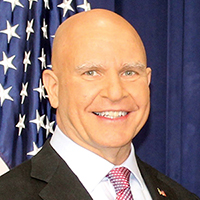
H. R. McMaster is the Fouad and Michelle Ajami Senior Fellow at the Hoover Institution, Stanford University. He is also the Bernard and Susan Liautaud Fellow at the Freeman Spogli Institute and lecturer at Stanford University’s Graduate School of Business. He was the 25th assistant to the president for National Security Affairs. Upon graduation from the United States Military Academy in 1984, McMaster served as a commissioned officer in the United States Army for thirty-four years before retiring as a Lieutenant General in June 2018.







